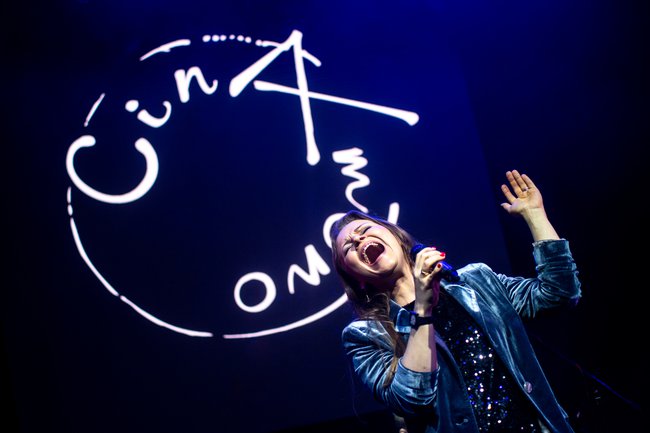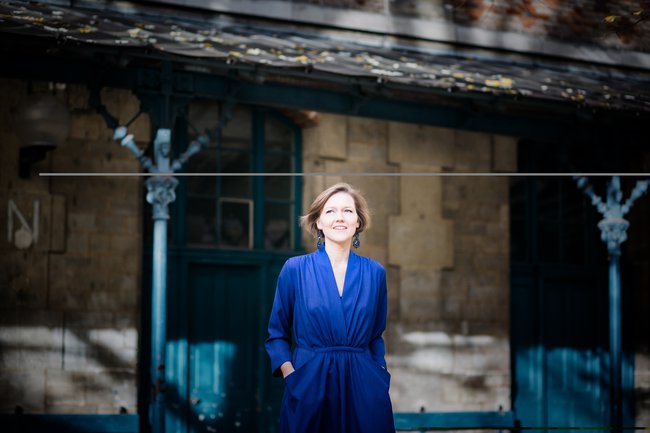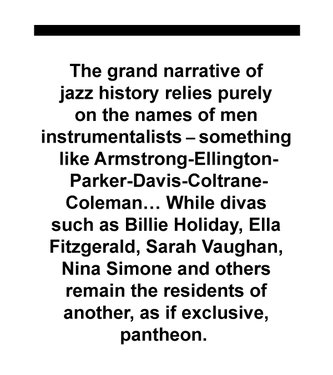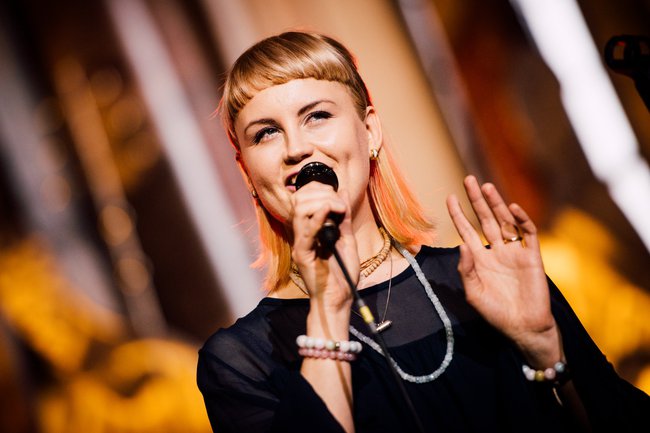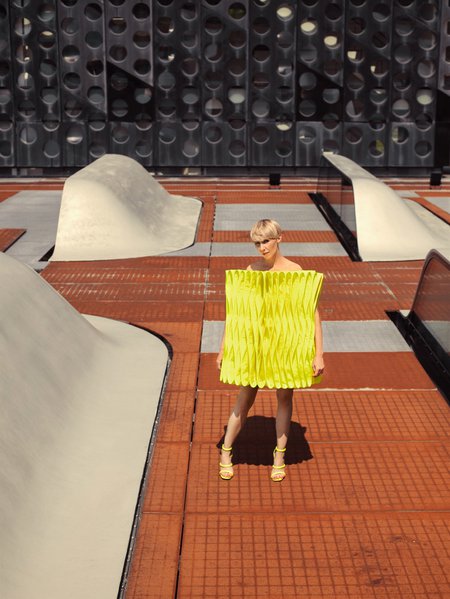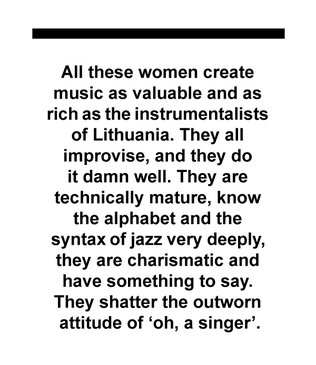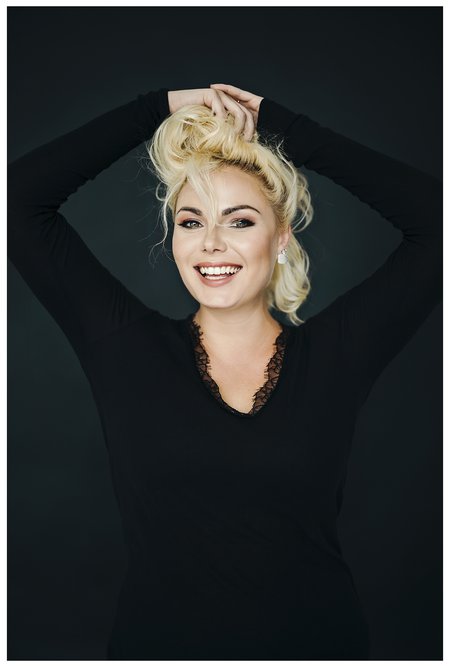Laima SLEPKOVAITĖ | Oh, a Singer… Improvising Vocalists of the Lithuanian Jazz Scene
There is nothing more poetic than the voice of a human being. It’s the prototype of all melodic instruments invented by people, it’s the music-making tool given by nature, with an undoubtedly special status in the hierarchy of sound sources, it’s obviously valuable. This is true in all genres. Jazz is no exception! The singing ladies of jazz history are exalted, even deified, and of course they enjoy the largest slice of public attention on the concert stage as well as in the record industry. However, the grand narrative of jazz history, as seen in most of the chrestomathic jazz history publications, relies purely on the names of men instrumentalists – something like Armstrong-Ellington-Parker-Davis-Coltrane-Coleman… While divas such as Billie Holiday, Ella Fitzgerald, Sarah Vaughan, Nina Simone and others remain the residents of another, as if exclusive, pantheon. It’s impossible to deny a close connection between the worlds of sung and instrumental improvisation. It is quite complex. See, the vocal, on one hand, embodies the pursuit of natural sound, the highest form of emotional expression, and exceptional creative achievements that inspire the artists… On the other hand – the musicians who sing betray their artistic ideals more often and not only migrate between different genres (which is positive and supported in the jazz world), but also give in to commerce, which is often accompanied by poor taste. So as if by default, every singing human being, who hasn’t yet become a deity of the ‘pantheon,’ has a greater potential to become a superficial, shoddy musician than an instrumentalist. A variety of myths, prejudices and anecdotes originating here determine a certain duality in the status of vocals in the jazz field. It’s worth keeping in mind that this duality is influenced not only by the popularity of the profession and the qualitative variety of the musicians, but also by enduring sexist superstitions. So, the jazz voice in this world has to be sound, virtuosic and convincing, to prove that it is professional, equal, an active creative element in music, and that the owner of the voice has thoughts.
The Lithuanian jazz scene dances to the same tune. Although the national grand narrative of jazz is associated with the trio of Ganelin, Tarasov and Čekasin, as well as wind players and pianists, who have shaped the tradtion of improvisational music, the exclusive pantheon of female singers is far from being empty. Let’s give it a visit.
The first person we meet is Marina Granovskaya and – although our radars are currently tuned to follow the vibrations of women’s voices – we cannot miss Steponas Januška popping up amongst the ladies. They were given this incredibly big task of adapting the jazz vocal technique and laying the foundation for the local tradition. While listening to Granovskaya an exclamation mark pops out of the ears – ‘oh, this is how it’s done!’ – her powerful voice carries the message that the mysterious culture of jazz singing is not that unavailable. She fled Lithuania in 1990 and we were left with only a bunch of recordings witnessing a bright talent and an early synthesis of jazz and the local estrade music techniques.
Steponas Januška didn’t go anywhere, he kept on researching the vocal performance in jazz in Klaipėda, Lithuania, and having developed a deep knowledge of traditional vocal techniques, became a pedagogue who keeps on nurturing good and great women vocalists in the branch of the Lithuanian Academy of Music and Theatre in Klaipėda. When the Department of Estrade Singing in Vilnius was closed, Klaipėda became the main training ground for entertainment music vocalists. Students from this school have mostly enriched many other genres – this is a natural and normal side effect which is good for both the entertainment and jazz industries. But the tradition was born, a reliable and stable source of knowledge.
Notably, the first ‘nugget’ of its kind, a voice so very big, unique, and authentic, was found someplace else – a flutist, a student at the Lithuanian Academy of Music and Theatre at the time, released her constant restlessness into sound and the world heard Neda Malūnavičiūtė. Alongside her, Arina Borunova – the queen of blues – surprised audiences with the power of her jazz vocal. She is a rare guest in the world of improvisation these days, but she has surely changed the perception of what a voice and its energetic charge can do in the performance of the jazz standards.
Neda has remained in the jazz field since the time she actively started singing (the eighties). She opened a completely different page in our jazz history to those of Marina Granovskaya or Steponas Januška, and she went even further than her magnificent colleague Arina. By the way, that entire new page only has one name written – NEDA, and there is nothing else there, because there are no singers who would dare to take the same trajectory and there is no similar voice in Lithuania. Nevertheless, her influence on the local scene has doubtlessly been colossal and deep.She didn’t take the route of attempting to comprehend classic American jazz vocals. What she has in her arsenal is an entirely intuitive and unique technique. Her open throated sound is familial to the free Lithuanian folkloric singing that pervades ploughed fields. That is the natural sound of our nation. At the same time, it is a universal sound, so Neda moves across genres without the slightest discomfort or any tangible shift. She is full of theatrical expression, and the instrumental jazz education and experience taken from Vladimir Čekasin empowers her to a fascinating and creative improvisation.
Neda has no students, but her daring dive into improvisation is the nirvana sought by many musicians, and she inspires many on their way. Plenty of colleagues are influenced by her in one way or another. Her long time partner, saxophonist Vytautas Labutis, has already acquired some of ‘Nedisms’ in his vocabulary, while pianist Richardas Banys changes, grows and matures dramatically in contact with her voice and is influenced by her no less than by his piano instructors.And who could have ever thought that Giedrė Kilčiauskienė, the complete opposite to Neda, would also think of Neda as a role model and openly declare her admiration. Giedrė’s strengths are very different. Neda is so tremendously large – with her temper, fireworks, getting carried away and madness… The main resonator of Giedrė’s voice is the brain; her singing is very intellectual in the sense of sound formation and technique (there is a lot of reason, control, mastery, nuances extracted and controlled by with deep understanding of the voice anatomy), as well as in the musical contents she chooses and creates. In emphasising the intellectual aspect, I don’t mean to imply some kind of self-contained mathematics. On the contrary, her superpower is a healthy attitude towards life, a sense of humour, and the ability to versify small everyday truths into the charming, worldly poetry. She is not mimicking anyone and her voice is ‘built’ only in as much as is necessary for its functionality. Giedrė sings in her natural timbre, which is soft, sweet, matt, unique and makes no attempt at decoration with mannerisms, whether she sings jazz, electronic music or something else.
Giedrė, in turn, is a pedagogue, and a very important part of a massive vocal ‘explosion,’ which happened at the turn of the century catalysed by the opening of jazz vocal study programmes at the Vilnius University of Applied Science and the Lithuanian Academy of Music and Theatre. The smaller part of that ‘explosion’ remained on the jazz scene, but there was a noticeable increase of the professionals in this field, and the school expanded and matured directly before our eyes in just a few years. Already the first few classes brought to the local stage professionals such as Kristina Žaldokaitė, Girmantė Vaitkutė, Rūta Švipaitė, Vytautė Pupšytė and more currently active or less active jazz musicians. The deficit in high quality vocals melted like an ice cube dropped in hot coffee.And the stars light up way more often.
One to be labelled a star of the jazz scene is undoubtedly Veronika Čičinskaitė-Golovanova (Veronika Chichi), who is currently working on her second album. She has the courage to do technically difficult things – fast scat improvisations, wide range and wide dynamic spectrum pieces, big, generous voice… At the same time, there is a lot of risky, real improvisation, and again she is refined and ambitious, aiming to wring every possible accessible note out of her voice. It could be said that she is a part of the global renaissance of traditional jazz vocals. She takes inspiration from that great school, refracts it through her personal prism and creates her own songs – rich, very well composed, each of them with an original idea and message.Another strong singing composer is Laura Budreckytė. She is virtuosic in a very different way, she pays quite a lot of attention to sonoral voice effect, playing with the voice, which, by the way, is reminiscent of the instrumental sound manipulation of the Vilnius jazz school. She is currently working with a band called CinAmono, which is a perfect creative lab for her, a mini-theatre turning each of her songs into a bright, almost visual sound narrative. Laura’s instrument is transparent, crystal clear, colourful and multifaceted. It enables her to easily create contrasting atmospheres and tell different stories, from funny fables to ephemeral poetic scenes, love lyrics or dramatic, developed pieces with a philosophical charge.
Viktorija Pilatovič also has a well-defined compositional style and a very powerful voice capable of transferring ideas from the paper into the air. She is from Klaipėda and studied jazz vocal at the Lithuanian Academy of Music and Theatre, but eventually went on to study at Berklee College in Valencia, where she successfully established herself on stage. She has already released three albums and now teaches jazz vocals there. She surely has something to share with her students, because, again, she has the full range of skills: amazing technique, scat improvisation, great intonation, and instrumental, elaborate and intense singing. Her work is very contemporary, pulsing with the atmosphere of the current moment, expressive and very subjective.A different Viktorija, one who lives in a far-away country, Viktorija Gečytė, has tried to run away from her musical destiny, but didn’t succeed and today is actively performing in Paris, where she currently lives, and elsewhere. She became even more widely recognised last year when she was awarded third prize at the Sassy Awards – one of the largest jazz vocal competitions in the world.
There is an unwritten rule on the Lithuanian jazz scene: write your own music and try to play it differently from how jazz is played in the USA, because to do that would be a copy, a forgery or even a caricature. This rule doesn’t apply in Viktorija’s case. All the swing standards, beautiful ballads, blues – it was made for her. She has the blue blood, she is a member of the royal jazz family. Viktorija lived in the USA for some time, but that wasn’t the place where she learned how to swing. The sense is inborn and she got it together with the deep, clean and large voice, beauty and taste. With courageous work on that she grew to become a real improviser, a professional mature artist capable of unlocking centenerial songs and evoking excitement about them – simply, graciously, purely with the charms of her voice…
This is what one of the steps of the Lithuanian jazz vocal ‘pantheon’ looks like… Many interesting voices are heard alongside each other, but this time we have discussed only those brightest ones that are really active on the jazz scene currently. They are very different and don’t reveal any tendencies at first sight, but there is one very clear common feature between them: all these women create music as valuable and as rich as the instrumentalists of our country. They all improvise, and they do it damn well. They are technically mature, know the alphabet and the syntax of jazz very deeply, they are charismatic and have something to say. They do create important music. And they shatter the outworn attitude of ‘oh, a singer’.
Translated from the Lithuanian by Erika Lastovskytė
